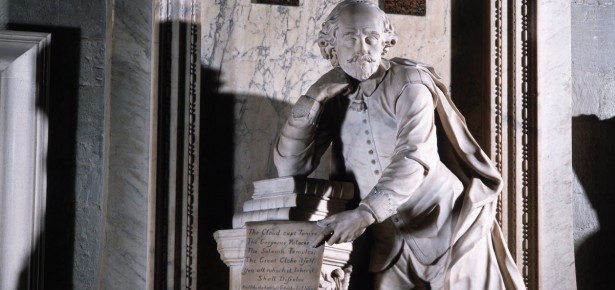
photo: Armstrong White via Creative Commons
Director Phyllida Lloyd has received widespread acclaim for her recent all-female Shakespeare productions at the Donmar Warehouse in London. Following the success of her 2012 Julius Caesar, Lloyd staged Henry IV in 2014, with Harriet Walter leading the cast of both productions as Brutus and King Henry. In an article for the Guardian, Walter explores the multiple benefits of these stagings. They offer the “ageing actress” (her term) meaty roles in Shakespeare beyond the limited number of older female characters in his works. Walter also argues that all-female productions allow us to see the plays afresh and to look beyond gender to our common humanity. Most importantly, these productions enable “all classes of women to feel they own, belong to and have a stake in our history and our culture”.
Women’s interest in Shakespeare’s histories has deep roots in the eighteenth century. In the 1730s, a group called the Shakespeare Ladies Club petitioned the managers of the London theatres to stage more Shakespeare plays. Significantly, they focused on reviving the histories, many of which had not been performed for many years. Their appeals were successful, increasing the number of history plays in the theatrical repertoire. The Club’s efforts constituted part of a renewal of interest in Shakespeare that eventually led to the erection of a monument to the Bard in Westminster Abbey.
Then in 1769, Elizabeth Montagu became the first critic to engage seriously with Shakespeare’s history plays as a genre. In her Essay on the Writings and Genius of Shakespear she wrote an in-depth analysis of the first and second parts of Henry IV and included a chapter “On the Historical Drama”, which examined the concept of the history play in detail. Montagu describes how in these works, “the poet collects, as it were, into a focus those truths, which lie scattered in the diffuse volume of the historian, and kindles the flame of virtue, while he shews the miseries and calamities of vice”. Shakespeare’s history plays are moral teachers that use the events of England’s past to make us better human beings.
In both these eighteenth-century examples, women’s interest in the history plays was motivated by nationalism, perhaps unsurprisingly in a period that saw continuous battles with the French. The Shakespeare Ladies Club was widely praised in the press for encouraging old plays that were full of British spirit. And the full title of Montagu’s work reveals that she was countering Voltaire’s blistering critiques of the Bard and establishing Shakespeare as the English national poet, a process that scholars such as Michael Dobson have identified as taking place in the eighteenth century and culminating in 1769, the year Montagu’s critical work was published and the year that David Garrick held his famous Jubilee in celebration of Shakespeare at Stratford-upon-Avon. As Harriet Walter says, “what better place … than in a Shakespeare history play” for women to tackle some of the most pressing issues of the day and to make their voices heard over those of their male contemporaries?
To win Women and Shakespeare in the Eighteenth Century enter our daily Shakespeare giveaway, Much Ado About Winning – www.cambridge.org/shakespearewin
Latest Comments
Have your say!